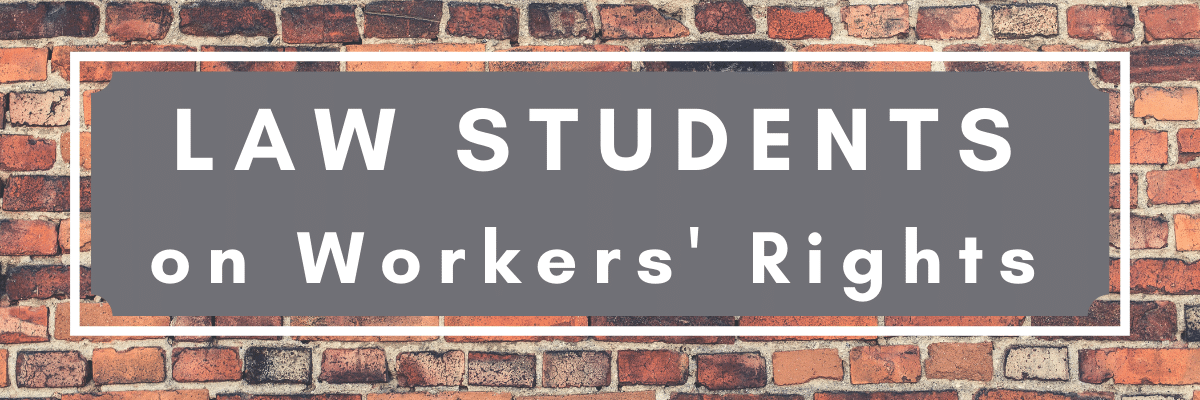
The Gig’s Up: The Challenges of Workers’ Rights in the Gig Economy
July 11, 2023
By Grace Condello
The Law Students on Workers’ Rights series publishes essays from current and incoming students at some of the top law schools in the country. These essays, submitted for the Charles E. Joseph Employment Law Scholarship, address the question “What are the biggest challenges facing workers’ rights in the future?”
Gig work has multiplied as companies utilize app-based platforms, as seen with Uber, Lyft, and Caviar. It is estimated that 9% of adults in the United States are current or recent gig workers for an online platform. With the promise of greater flexibility, increased independence, and higher wages, gig work is an attractive form of alternate employment. However, on the flip side of these promises are inconsistent wages, algorithmic management, and contingent working conditions. The shimmering ideal of gig work is not what it purports to be; it is a facade that threatens the future of workers’ rights.
The term “gig work” encompasses a variety of meanings, from professional-level employment in higher education to low-wage delivery drivers and rideshare workers through digital platforms. In this discussion, the focus will be on the latter definition. An additional definitional distinction is between an employee and an independent contractor. Rideshare and delivery platforms like Uber rely on a business model that classifies workers as independent contractors instead of employees. The legal rights of independent contractors differ from those of employees; independent contractors do not have the right to a minimum wage, overtime pay, paid leave, unemployment insurance, the right to a union, and protection from discrimination and sexual harassment. Further, 31% of online gig workers claim this type of work as their primary job. An independent contractor classification leaves these workers without employer-sponsored health insurance, and potentially without health insurance at all.
However, app-based workers lack even the limited freedoms that independent contractors have, such as wage control and how their work is completed. This overlap creates a definitional gray space that companies are eager to mold to their advantage. In 2020, rideshare and delivery companies spent over $200 million dollars pushing Proposition 22 to maintain drivers as independent contractors rather than employees. Proposition 22 removed protections granted by Assembly Bill 5, an earlier law mandating employee classification for gig workers that ensured certain benefits such as overtime pay, employer-provided health care, and unemployment insurance. The proposition was approved by voters in November 2020 and upheld by a state appeals court in March 2023.
Centered around the reasoning in Proposition 22 is how Uber does not present itself as a transportation company but merely an app used by drivers who themselves provide services. According to Uber and other rideshare companies, workers are free from employer control and perform work outside of the usual course of their business. However, this illusion of choice is challenged by the algorithm used by the Uber app, which manages ride loads and rewards drivers who have completed more rides by notifying them of potential rights first. Fares are also significantly higher at certain times of the day, which incentivizes drivers to work those hours. Further, drivers cannot choose who rides with them and are penalized for rejecting trips.
Algorithms execute computerized control by directing workers through online commands and measuring their success by delivery times and client feedback. Workers are reduced to data points as the algorithm calculates their compensation according to these statistics. Additional research argues that algorithmic mediation not only creates barriers between bosses and workers, but also allows monitoring at a much closer level than a typical employment relationship. The scope of algorithmic management and direct control exercised by these app-based platforms exceeds that of contracted employees. Yet, gig workers do not receive the employment benefits this oversight warrants.
Along with management, research suggests that algorithms calculate wages differently between workers – applying dynamic formulas to data collected on workers’ location, behavior, and other factors – despite the comparable nature of the work being performed. The inconsistency of wages often results in workers earning less than the minimum wage per hour. Statistics reveal that 29% of gig workers make less than minimum wage in their state, compared to just 1% of W-2 workers.
It is no secret that the rise of the gig economy has changed the employment landscape, but the coupling of technological advancement with gig work has caused workers’ rights to become increasingly insecure. Further research must be conducted to analyze whether gig work can live up to its promise of greater independence and flexibility, or if app-based gig work breeds an unstable and exploitative work environment.
Reflections from Charles Joseph
The percentage of workers classified as independent contractors has skyrocketed in recent years. From an employment law perspective, this leaves countless workers without vital legal protections, including most wage theft laws. As Grace Condello argues, not all of these independent contractors fall into the same category. Gig workers who follow the directives of an algorithm have even fewer legal protections.
What’s the solution? Without action, gig workers will continue to face low wages and poor working conditions. Some states and cities have taken one step by protecting freelancer wages. The NYC Freelance Isn’t Free Act offers double damages for underpaid or unpaid freelancers. Yet even this law cannot reach the gig workers at the whim of the algorithm. There’s more work to be done, both for employment lawyers and policymakers.
Grace Condello holds a bachelor’s degree in political science from Westmont College. In the fall, she will join the class of 2026 at the University of Richmond School of Law.
Charles Joseph has over two decades of experience as an NYC employment lawyer. He is the founder of Working Now and Then and the founding partner of Joseph and Kirschenbaum, a firm that has recovered over $140 million for clients.